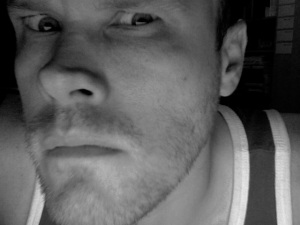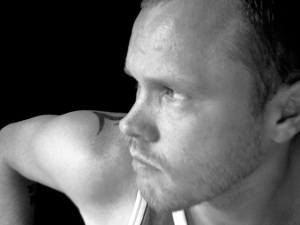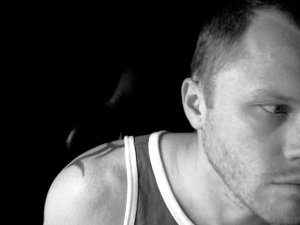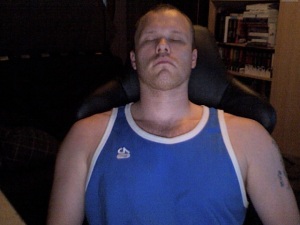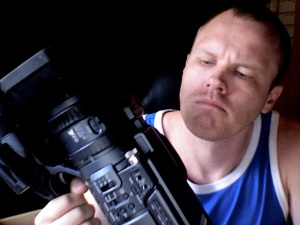
- From my mind to yours
This is more for me then anyone else, and its a bit all over the place so forgive the uneditedness of it.
Last night, instead of writing it down, like I should have done, I had a chat with myself. In my head not out loud, that would be weird. I usually do this if I need to figure something out, because I can then visualize the situation as if someone is asking me. I seem to be able to deal out good advise on subjects I know about but can never deal with it for myself. Which is odd but there you go.
So last night I asked myself a question from the perspective of an amateur film maker wanting advice of bigger productions, doing this also helps me set out a game plan.
I then proceeded to detail everything I currently know about the process, starting with Pre-Production then principal photography then post-production and film festivals and distribution. That, at best you might be involved with this film for many years.
So I should try to remember what I said last night, this mind chat lasted a few hours. I sometimes have these mind chats about science stuff black holes and what not.
So Pre-Production, it always starts with the idea, that idea can usually be very vague, it might actually only be a scene that you now need to put into context. Once I’ve written down as much detail about this idea as I can I write up an outline, which is usually only 3 or 4 pages long and is very rough, but I try to get the basic plot and story with the hooks and twists and turning points. After that I write a treatment and I pack as much detail as I can into this, which is why its usually 20 to 25 pages long. Here I get to know my characters and their dynamics and relationships I decide on locations, or at least what I would like to have, I even throw in dialogue if I feel I need to, like if I came up with something that sounds good I what to remember it later, if there is an action scene I’ll just write ‘ACTION SCENE’ and not write anything, unless something happens in that scene that will affect the characters afterwards. I had an action scene in a previous script where a main character lost an eye and was tortured. So I just wrote that, “So and So is tortured and looses an eye” I then continue, letting it flow writing lots of detail even though I might not use any of it, its nice to have. I then look at the treatment and cut it up into the three acts, I then cut up those acts into scenes, and write them out onto index cards, and now I spend a little time sorting them out moving scenes around if I need to. I tend to write for the Hero (Protagonist) and neglect the Villain (Antagonist) so here is where I look at the film from the villains perspective, I now “become” the bad guy and decide what he or she is doing while the hero is doing his or her thing, I then add the extra index cards and update the treatment, which can grow to maybe 30 pages. Once the treatment and index cards are done, and I’m happy with them, I start the script. Having everything already sorted out, knowing where your going with the story helps me write and I can get it done a lot quicker. I’ll usually try to get between 5 and 10 pages done each day. If I write for to long I tend to get vague, stopping for a bit, even if its just an hour helps me continue writing at the same level. Also I try to write scene by scene rather then seeing the whole picture because then I just try to get to the more interesting bits quicker. And I always keep in my head that its only a rough draft and will be edited in rewrites later on.
Once the script is completed in rough draft I start rewrites, my first rewrite isn’t really a rewrite, as such, I check my spelling and grammar. Then I go through a check list of 7 things to sort out in the coming rewrites, Characters, Conflict, Action, Plot, Construction, Content, Practicalities.
Do the characters work, are there to many, as this will have little or no budget, its better to have less characters, so I hack the characters if one isn’t needed they are gone, only main characters that move the story along are immune to the axe, if a supporting character only has a few lines, I get rid of it and give those lines to someone else. Basically rewrites give you the opportunity to tighten up everything, once your happy with a “locked” script it could be several pages lighter. This isn’t a bad thing. And don’t for a minute think that your script rewrites are over.
This is where I’d bring in a producer, if its a short film or super low budget feature you might end up also being a producer, but its always nice to have an extra pair of eyes. Because now your going to break up that script into a the different locations, characters and film days, you need to know how many different locations your going to need because you only want to visit that location once, get everything you need then move on, you need to know what characters are needed for that location, and roughly how many days you going to need that location. This will all help you build your shot list. Do this for all the locations. I location manager would also be nice but you might not have the budget for one, so get out there and find what your looking for. Its best to visit locations around the time you intend to shoot there, take light and sound readings, this you’ll give to the DoP and lighting crew, you should already know the angles you want to shoot, so this is also a good opportunity to see if you can get the shots you want, never underestimate the value of getting as much information on a location as you can, the more the crew knows before they get there, the better. Check each location for access, and weather the neighbours will be an issue, it might be a good idea to produce a leaflet to inform the neighbours, if any, that you’ll be around, when your going to start and how long you intend to be around and and weather you might be making any noise. Check for some kind of “green room” a place to put the actors before and after set ups, a place where the crew can eat and relax, also if you having craft services (Catering) where will it go.
During this time you should have already sent out a notice for actors to audition. Its better to not have auditions in your house, find a place comfortable where you can put the actors before they audition, then see them one at a time, as it might be the first time for some and even seasoned actors get nervous, try to see if its the nerves that are coursing a bad performance its important that they feel comfortable, so you can get their best, give them a page from your script and give them the context of it. Then test the actor, ask them to do it again, but this time as if they are on drugs or perform a sad scene happy. Once you picked you call backs, try to put actors together, test out dynamics and chemistry. Take you time, if you have the time. You want the best possible performance for you film, and good actors will make you film better. So once you’ve picked them, I’d bring them in for costume and make up tests. If your going to use a HDSLR or a 16mm cine camera you want to know how they will look, if they have any blemishes that need covering, again the make up artist will appreciate the heads up before hand, and if the costume look right for the characters and if your using radio mic’s do they hid will. It better to deal with this now rather then on set where you’ll be wasting light, time and money. Get as much done before filming as you can, find the problems now and find solutions. You going to have problems most of the way through your filming, thats a fact of film making, so reducing the amount before hand is always a good idea. If you have special make up or gore then again, get this all sorted and tested, if you know you’re going to be close on a prosthetic then your going to want to know how it looks in the format your using, better now then in post. It’ll give the special make up people a heads up on how much scrutiny their work will be under.
Back to the locations scouting, knowing what shots you want and where they are going to take place will inform you of what equipment you need, jibs, cranks dolls etc. And if there will be issues. Like if you want a crane shot but a tree is in the way, can you get the crank in there? Will it damage the ground, tear up grass. Ideally you wan tot leave the location in the same conduction you found it, don’t burn your bridges, you might end up having to go back there for a reshoot or pick ups, and then there might be other film makers that want to use that location. Keep relationships good with the people that own the location, if you do damage something, let them know immediately and take photos for the insurance company. Also knowing where your going to film will help the script, so once you have details on all your locations your in for another rewrite, nothing extensive just more information for the crew and cast so on the day, there are no surprises.
Pre-Production is a lot of work and could take as long as the filming and post put together. When I was doing carpentry in collage I was told to measure twice and cut once. Think of film making the same what, you want to cover as much as you can before you start filming, find those problems and the solutions.
Ideally you want all your cast and crew in place long before you start filming, that everyone knows what they are doing, when they are doing it and where, so day one can be a good day, and hopefully that first day will go without a hitch, you’l need that good day or morale.
Create a shot list, Location list, character list, costumes and props list, regular and special make up if any, vehicles, camera equipment, jibs dolls cranes etc. Set dressing if needed, craft services or where the nearest food outlets are and coffee shops are to each location. Make sure any neighbours are aware that your going to be there. If any stunts, that the stunt team have enough time to check locations and rehears, if any visual effects or going to be used, that the VFX team get to the locations to get anything they need, they might even want to be around when your shooting those scenes. And its a good idea to have an editor ready to go, once you start filming stuff its a good idea to have the editor log and capture all the footage and even start the rough edit as you go.
You need to be as prepared as you can be before you start.
Next up, Principal Photography.

